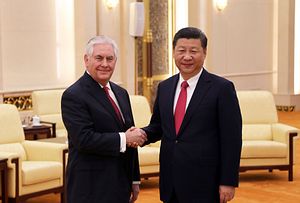Trans-Pacific View author Mercy Kuo regularly engages subject-matter experts, policy practitioners, and strategic thinkers across the globe for their diverse insights into the U.S. Asia policy. This conversation with Dr. Andrew Scobell – senior political scientist at the RAND Corporation, adjunct professor of Asian Studies at Georgetown University’s Edmund A. Walsh School of Foreign Service and author of China’s Search for Security (Columbia University Press, 2012) – is the 86th in “The Trans-Pacific View Insight Series.”
Grade Secretary of State Rex Tillerson’s recent trip to Asia on impact, influence and image.
Secretary of State Tillerson’s March visit to Northeast Asia was intended to signal to Asia-Pacific states that the Trump administration is firmly committed to and fully engaged with the region. This point was underscored by Tillerson’s visit following on the heels of a February visit by Secretary of Defense [James] Mattis to Japan and South Korea. Given that some of the high profile rhetoric by Trump when he was a candidate and the president-elect was widely interpreted as being highly critical of U.S. alliances, these visits were significant gestures intended to reassure two of America’s most important allies that the United States remains a steadfast partner. The visits were particularly timely because they came at a time when the North Korean threat is growing in severity and magnitude and China remains persistently assertive in its own neighborhood. Both trends are especially alarming to Seoul and Tokyo. The impact of Secretary Tillerson’s visit to Beijing is less clear. On the one hand, the visit unmistakably signals the Trump administration’s readiness to engage with China, on the other hand it remains to be seen what tone Washington will set and what substantive agenda Washington will pursue with Beijing during the next four years.
Explain the implication of Secretary Tillerson’s announcement that the era of American “strategic patience” is over.
The implications of this announcement are unclear. For critics of the Obama administration’s policy toward North Korea, the term “strategic patience” was a synonym for ignoring a problem. Certainly, Pyongyang’s nuclear and ballistic missile programs have made significant advances in recent years; indeed, both appear to have accelerated under the leadership of Kim Jong-un (i.e. since 2012). Consequently, it would be accurate to characterize the previous administration’s approach to North Korea as a failure. To be fair, however, there are no good options for dealing with Pyongyang. Over the past few decades every administration comes to Washington vowing to solve the North Korean nuclear problem. Each new administration conducts a policy review and some months later it pronounces that the key to resolving the Pyongyang problem is to get Beijing on board. Successive administrations then try to work with China but becomes tremendously frustrated, eventually greatly disappointed, and ultimately deeply disillusioned and cynical when Beijing seems unable or unwilling to deliver what Washington wants.
What is the impact of China’s opposition to THAAD (Terminal High Altitude Area Defense) in South Korea on Beijing’s ability to defuse North Korea’s provocations?
China’s opposition to THAAD deployment in South Korea greatly complicates its potential to play a constructive role on the Peninsula. Indeed, Beijing’s harsh pressure on Seoul is counterproductive and only serves to escalate tensions in Northeast Asia. Of course, the real problem is not South Korea’s efforts to improve its own defensive capabilities but rather the growing missile and WMD threats from North Korea. Beijing’s apparent inability to recognize that THAAD deployment is not really about China indicates that Xi Jinping remains more worried about actions by the United States and its allies in China’s Northeast Asian neighborhood than he is about continued North Korean provocations on Beijing’s doorstep. This suggests that despite an unprecedented level of frustration with Pyongyang, Beijing is still unable to come to terms fully with its truculent supposed ally.
Explain whether the notion of a “grand bargain” with North Korea is viable.
Currently, a grand bargain is not a viable option in dealing with Pyongyang. There is too much mutual distrust and suspicion between all parties but especially between the United States and North Korea. The ill-fated Six Party Talks (2003-2007) produced a multilateral agreement in September 2005 which amounted to a grand bargain. The collapse of this effort and the complete absence of any meaningful steps in the years since have produced a legacy of deep wariness and cynicism in Washington. Progress requires trust building and this will only happen gradually. Of course, the North Korea problem is not standing still, and hence the idea of reaching a “grand bargain” in the near future that offers the promise of first freezing and then dismantling Pyongyang’s strategic weapons program holds immense appeal.
Identify potential hazards in working with China to make progress on North Korea that the Trump administration should avoid.
Ditching “strategic patience” shouldn’t mean embracing impatience. In America’s eagerness to achieve results on North Korea, the Trump administration should not lose sight of the importance of being patient and shunning deadlines when working with China (or North Korea for that matter). Americans tend to be irrepressible optimists believing that every problem has a solution and near term results are readily within reach. While this “can do” Yankee spirit definitely has its upside, it also has a downside. This eagerness makes U.S. leaders prone to impatience and short timelines, which creates vulnerabilities that can be exploited by other countries. China possesses a corps of extremely skilled diplomats with extensive experience in negotiating with the United States on a wide range of issues and these negotiators possess considerable patience and a long term outlook. Fortunately, the Trump administration also has a talented bench of experienced diplomats and international negotiators at its disposal. Moreover, the U.S. national security community has some extremely useful resources to draw upon, including an excellent primer on how to negotiate with China authored by veteran diplomat and RAND researcher, the late Richard Solomon (Chinese Negotiating Behavior RAND Corporation, 1995; United States Institute of Peace, 1999).

































